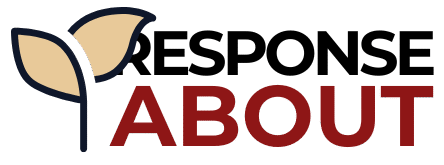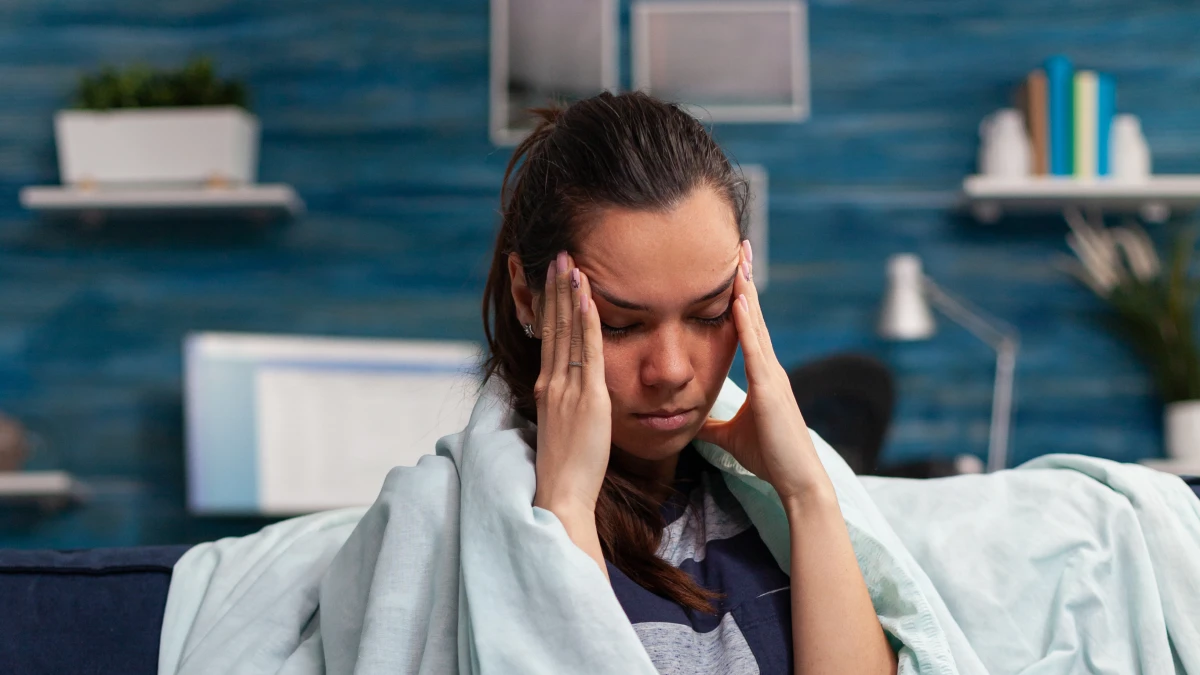You survive on coffee, push through the afternoon slump, and tell yourself you are just busy. But that constant fatigue is a warning sign of a silent epidemic. More than one in three adults are chronically sleep deprived, a public health crisis that quietly damages your well being.
Science shows sleep is the non negotiable foundation for your health. Many people suffer from this without realizing it, blaming stress for the subtle signs.
This guide will uncover 16 hidden symptoms and provide a clear, actionable plan to help you reclaim your rest and your health
More Than a Yawn: The Toll of Poor Sleep
Sleep Deprivation: By The Numbers
Cognitive Impact
~20%Drop in cognitive performance and problem-solving skills after just one night of sleeping 4-5 hours.
Emotional Impact
10xIncreased risk of developing depression for individuals suffering from chronic insomnia, according to some studies.
Physical Impact
50%Reduction in the activity of critical immune cells (Natural Killer cells) after just one night of partial sleep loss.
Behavioral Impact
0.05%BAC equivalent. Being awake for 18 hours straight impairs your reaction time as much as having a blood alcohol content of 0.05%.
Before we get to the signs, you need to know that sleep debt is more than just feeling tired. It’s a problem that affects the four key parts of who you are: how you think, how you feel, how your body works, and how you act. The signs of sleep deprivation are direct results of damage to your brain and body.
How It Hurts Your Thinking: When you’re short on sleep, the front part of your brain, which handles focus and decision-making, gets less blood flow. This causes the mental “glitches” that make you less effective and safe.
How It Hurts Your Feelings: At the same time, your brain’s emotion center, the amygdala, goes into overdrive. Without a rested brain to keep it in check, you become more moody, anxious, and quick to anger.
How It Hurts Your Body: Sleep is when your body does its repair work. It fixes cells and balances hormones that control hunger, stress, and your immune system. A lack of sleep messes up these jobs, making you get sick more often and paving the way for serious health problems.
How It Hurts Your Actions: When your judgment is off, your emotions are haywire, and your body is tired, your self-control disappears. This can make you pull away from friends, take more risks, and rely on bad habits to get by.
1. Your Brain Feels ‘Glitchy’ (Constant Brain Fog & Poor Concentration)
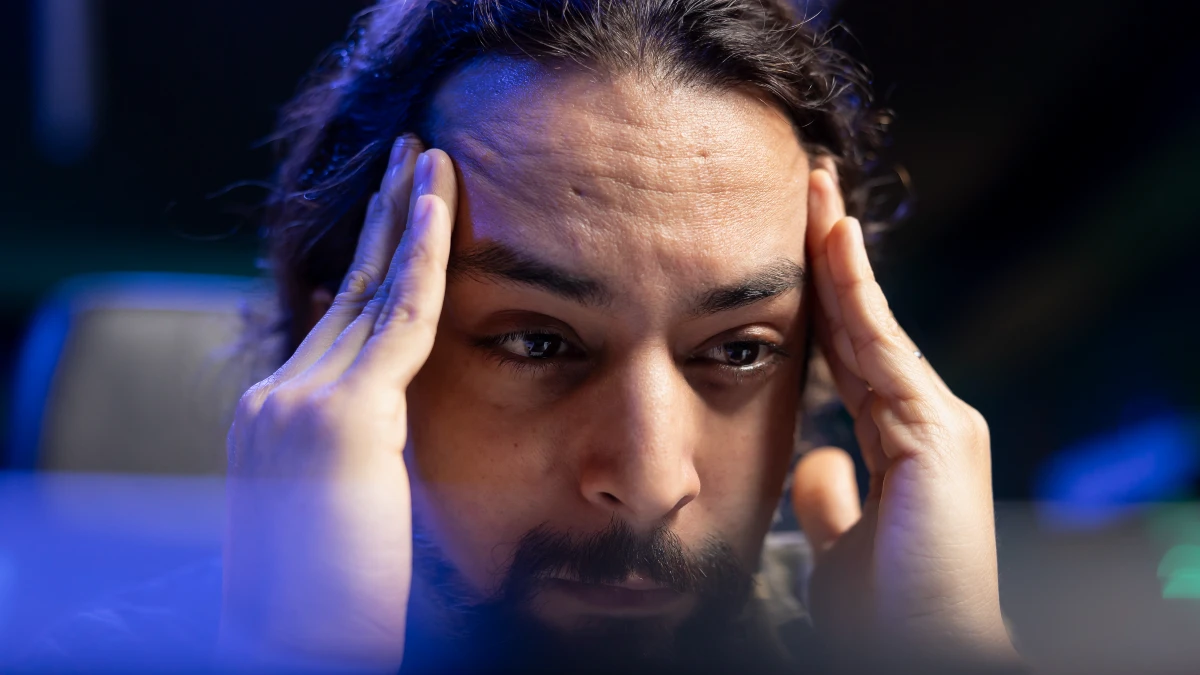
That persistent mental haze where your thoughts feel sluggish and focusing is a struggle is a direct result of a tired brain. This is not just a feeling; it is a physical event. When you lack sleep, the functional connectivity between different regions of your brain is disrupted, and your brain cells do not communicate effectively.
This impairment slows down your cognitive processing, making it harder to think clearly and react quickly.
The danger lies in how rapidly this impairment accumulates. After just a few nights of losing one or two hours of sleep, your ability to function is as poor as if you had not slept at all for a full day or two.
This brain fog is a direct threat to your performance and safety, leading to a significant increase in errors at work and a higher risk of accidents. It undermines your ability to perform tasks that require sustained attention and alertness.
2. You Can’t Make a Simple Decision

If you find yourself agonizing over small choices or making decisions you later regret, your sleep schedule is likely the cause. Good judgment requires a delicate balance between the logical part of your brain.
The prefrontal cortex, and the emotional part, the amygdala. Sleep loss destroys this balance. It reduces blood flow and activity in the logic center while making the fear and emotion center hyperactive.
This creates a perfect storm for poor judgment. Your brain is literally rewired to favor emotional, impulsive reactions over careful, logical thought. This impairment explains why a tired person might make a poor financial choice. Snap at a coworker over something minor, or struggle to make sound moral and social judgments.
Your ability to integrate emotion and cognition is compromised, leading to irrational decision-making.
3. You’re Experiencing ‘Microsleeps’ Without Realizing It
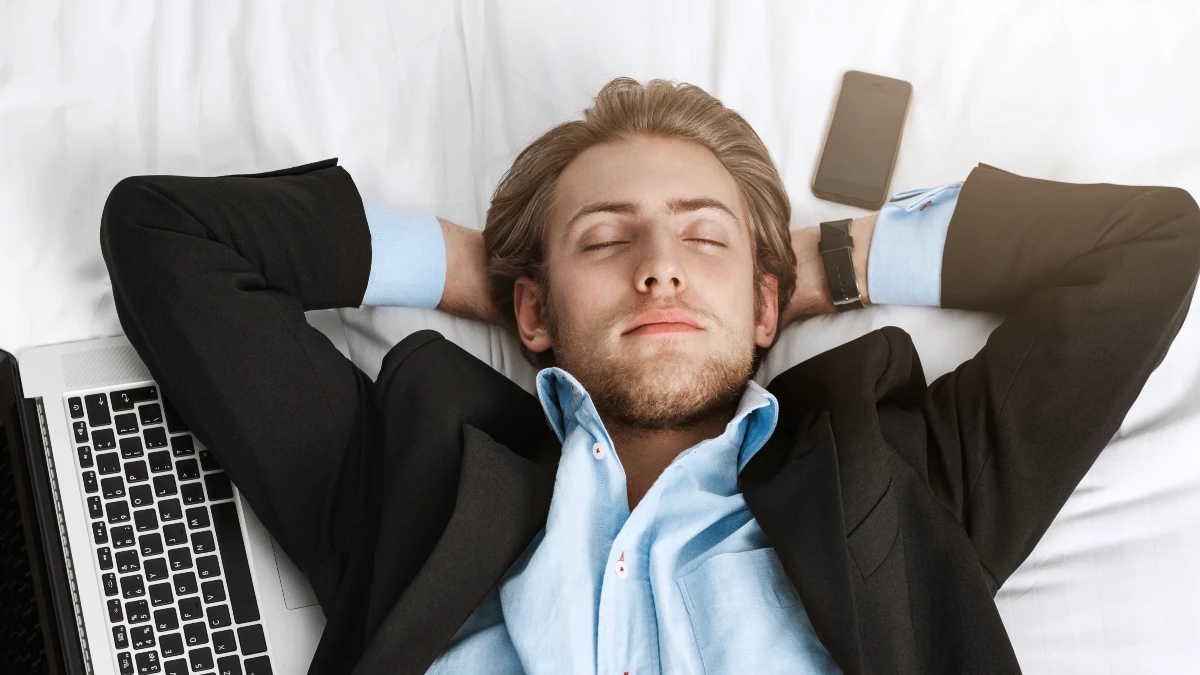
One of the most dangerous signs of sleep deprivation is the microsleep. This is a brief, involuntary episode of sleep that lasts for a few seconds while you are technically awake.
You are completely unaware it is happening because your brain is so desperate for rest that it forces itself to shut down, regardless of the situation. This is not simply dozing off; it is an extreme sign of exhaustion.
The real-world consequences of microsleeps are terrifying. If you have ever driven somewhere and then not remembered part of the trip, you may have experienced a microsleep.
This phenomenon is a major public safety hazard, as drowsy driving is responsible for thousands of fatal car crashes every year.
4. You Rely on Clichés and Slur Your Words

This subtle sign reveals the true extent of cognitive impairment from sleep loss. If you find yourself using generic phrases like “it is what it is” or “what goes around comes around. It is because your brain is too tired for creative, complex thought. It is using mental shortcuts or “crutches” to participate in conversations without expending much energy.
This happens because severe fatigue can mimic the effects of being drunk. In fact, being awake for about 20 hours straight makes you as cognitively impaired as someone who is legally drunk.
Your speech can even become slurred, and you may have trouble finding the right words. This shows that your ability to think critically and communicate effectively is seriously damaged, which can harm your professional and social credibility.
5. You Have a Dangerously Short Fuse (Increased Irritability)

Feeling easily annoyed, short-tempered, and emotionally volatile is a classic sign of sleep debt. As mentioned, sleep deprivation weakens the part of your brain that controls emotions while amplifying the part that processes fear and anger.
This leaves you with a hair-trigger emotional response system, unable to effectively manage your impulses and moods.
One study found that sleep-deprived people struggle to read facial expressions correctly, often misinterpreting neutral or friendly faces as threatening. This means you are not just overreacting; your perception of social reality is literally distorted.
You may see hostility where there is none, causing you to damage personal and professional relationships and create a self-perpetuating cycle of social stress and further sleep loss.
6. You Feel a Constant Hum of Anxiety

Anxiety and sleep have a deep, two-way relationship: anxiety makes it hard to sleep, and a lack of sleep fuels anxiety. If you feel a constant sense of worry or unease, it may be a direct physiological result of not getting enough sleep.
Insufficient sleep raises the levels of cortisol, your body’s main stress hormone, and increases feelings of agitation and arousal.
The statistics connecting sleep loss and anxiety are alarming. One major study found that people with insomnia were 20 times more likely to develop a panic disorder. Even short periods of sleep loss, like staying up an hour or two later than usual. Can measurably increase anxiety symptoms like a rapid heart rate and excessive worrying.
That feeling of dread you cannot shake might not be rooted in your life’s circumstances but in a chemical imbalance in your brain, driven by a lack of restorative sleep.
7. You Feel Socially Withdrawn and Lonely

If you find yourself avoiding social gatherings, feeling drained by interaction, and preferring to be alone, it may be a biological response to sleep loss, not a personality change.
Dr. Matthew Walker’s research found a phenomenon he calls the “social repulsion” effect. Sleep deprivation not only makes you feel asocial and withdrawn, but it also makes you seem less approachable to others, causing them to pull away from you.
This creates a vicious cycle of loneliness. A comment from a viewer of Dr. Walker’s work shows how real and painful this is: “No one understands why i just want to be left alone alone and alone”.
This is a critical point because loneliness is a significant health risk factor, comparable to smoking or obesity. Your lack of sleep could be actively dismantling the social support system that is essential for your long-term mental and physical well-being.
8. Your Mood is Flat and You’ve Lost Your Spark (Blunted Positive Emotions)

Sleep deprivation does not just increase negative emotions; it also steals positive ones. If you feel a general sense of flatness or an inability to feel pleasure, a condition known as anhedonia, it may be a sign of emotional blunting from sleep debt. A tired brain loses some of its capacity to experience positive emotions like joy and happiness.
A comprehensive review of over 50 years of research found that all forms of sleep loss, including shortened duration and nighttime awakenings. Resulted in a significant decrease in positive emotions.
You are not just more irritable; you are being systematically robbed of the joy in your life. This is a serious warning sign, as trouble sleeping is often the first symptom of depression. Studies have shown that people with insomnia are five times more likely to develop major depression.
9. You’re Always Hungry and Craving Junk Food

If you are constantly battling cravings and an insatiable appetite, your hormones are likely the culprit, not your willpower. Sleep is essential for regulating the hormones that control hunger.
Sleep deprivation delivers a hormonal double-whammy: it lowers levels of leptin. The hormone that signals you are full, while increasing levels of ghrelin, the hormone that signals you are hungry.
This hormonal imbalance makes you feel hungrier than you should and less satisfied after eating. Furthermore, a tired body craves quick, high-energy foods, which is why you reach for sugary, high-carbohydrate snacks instead of healthier options.
These cravings are a biological command from your sleep-starved brain, putting you on a direct path toward weight gain. Obesity, and an increased risk of developing diabetes.
10. You Get Sick All the Time

Constantly catching colds or feeling like you cannot shake an illness is a clear sign that your body’s defenses are compromised. Your immune system does critical work while you sleep, producing infection-fighting cells and proteins.
When you cut sleep short, you weaken this process, leading to immunodeficiency and a state of chronic, low-grade inflammation.
The evidence is compelling. One study found that people who slept less than five hours per night were four times more likely to catch the common cold compared to those who slept for six hours or more.
They are a sign that your immune system is not getting the nightly reinforcement it needs to protect you effectively from germs and viruses.
11. Your Skin Looks Older and You’re Breaking Out
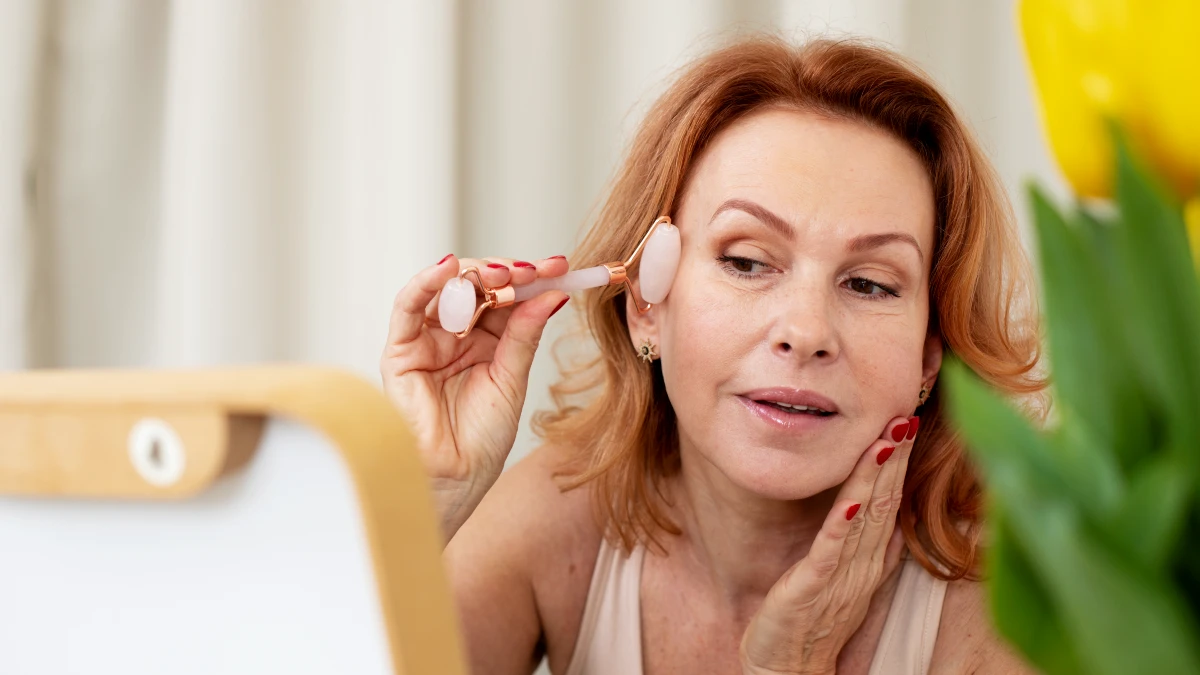
Your skin is often an external mirror of your internal health. If you notice premature fine lines, a lack of firmness, or persistent acne. It could be a physical manifestation of sleep debt. Poor sleep triggers a spike in the stress hormone cortisol.
Chronically elevated cortisol breaks down skin collagen, the essential protein that keeps your skin smooth, firm, and elastic.
The result is skin that looks less hydrated, less firm, and, in a word, older. The inflammatory response triggered by a lack of sleep can also lead to breakouts, especially around the chin.
While you may blame your skincare routine, the root cause could be the systemic stress and inflammation being driven by your poor sleep habits.
12. Your Libido Has Vanished
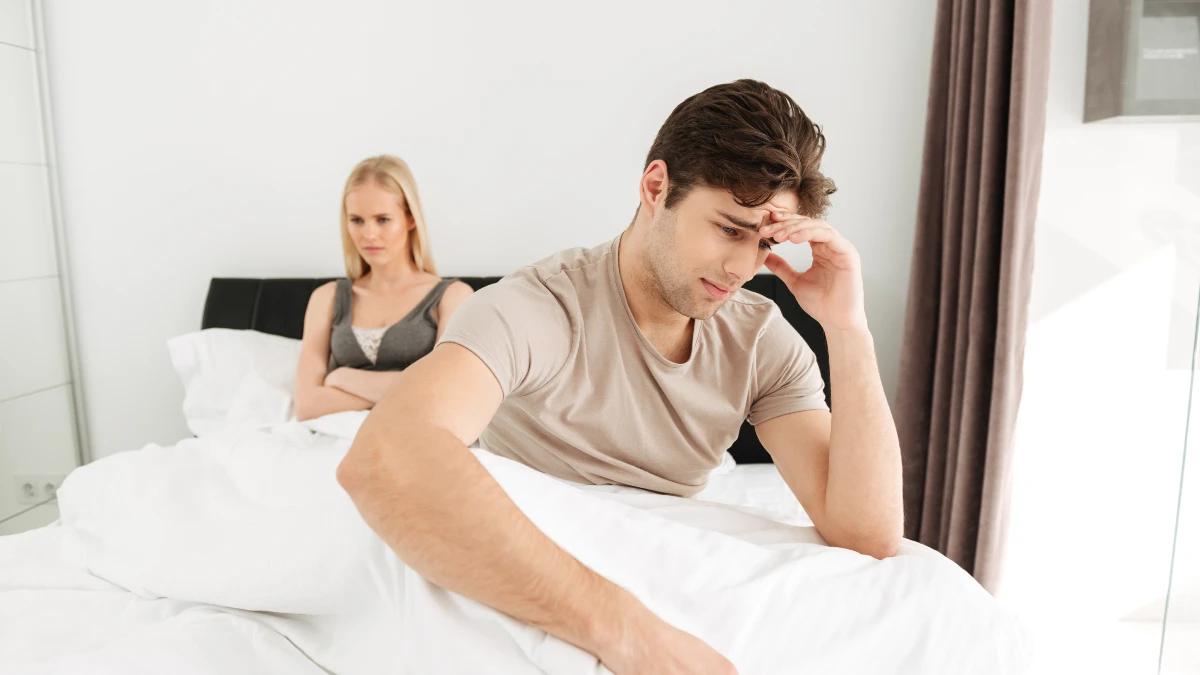
A decline in sexual desire is a common but often undiscussed consequence of chronic sleep deprivation. The reasons are both physical and mental. For men, sleep deprivation can directly lower testosterone levels.
Just one week of sleeping six hours a night can lower a healthy young man’s testosterone to the level of someone ten years their senior.
For everyone, the simple reality is that physical and mental exhaustion leaves little to no energy for intimacy. A low libido can place significant strain on intimate relationships and is often blamed on work stress or relationship issues.
It is crucial to recognize that it may be a direct biological consequence of sleep debt, impacting a fundamental aspect of your quality of life.
13. You’re More Impulsive and Taking More Risks

Sleep deprivation impairs the prefrontal cortex, your brain’s center for impulse control and rational thought. When this “CEO of the brain” is offline due to fatigue, more primitive, emotional, and risk-seeking behaviors take over.
This degraded impulse control is a dangerous sign that can lead to life-altering consequences.
Research shows that sleep-deprived teenagers are far more likely to engage in risky behaviors such as reckless driving and unprotected sex. This is explained by the “Mind After Midnight” theory, which states that your brain makes choices late at night that it would never make during the day.
This is due to the combination of cumulative daily stress, fatigue, and fewer social guardrails when others are asleep.
14. You Binge-Watch TV Shows Late Into the Night

Staying up late to watch “just one more episode” is more than a bad habit; it is a symptom of the sleep deprivation cycle. A huge 88% of American adults report losing sleep due to binge-watching television.
This creates a destructive feedback loop. You stay up late because you cannot switch off, which exposes your eyes to blue light from the screen. This blue light suppresses the production of melatonin, the hormone that signals your brain it is time to sleep.
This makes your subsequent sleep quality even worse and perpetuates the cycle night after night.
15. You Feel Groggy After a Full Night’s Sleep

If you consistently spend seven to eight hours in bed but wake up feeling unrefreshed and exhausted, it is a major red flag. This points to a problem with sleep quality, not just quantity.
Waking up feeling unrested is a key symptom of sleep deprivation and suggests that your sleep architecture is being disrupted.
This could be due to an underlying and often undiagnosed sleep disorder. Conditions like obstructive sleep apnea or restless legs syndrome can cause hundreds of brief. Unnoticed awakenings throughout the night, preventing you from reaching the deeper, restorative stages of sleep.
If you are putting in the hours but getting no restorative benefit, it is a strong signal that simple sleep hygiene may not be enough and professional evaluation is needed.
16. You Live for the Weekend Sleep-In
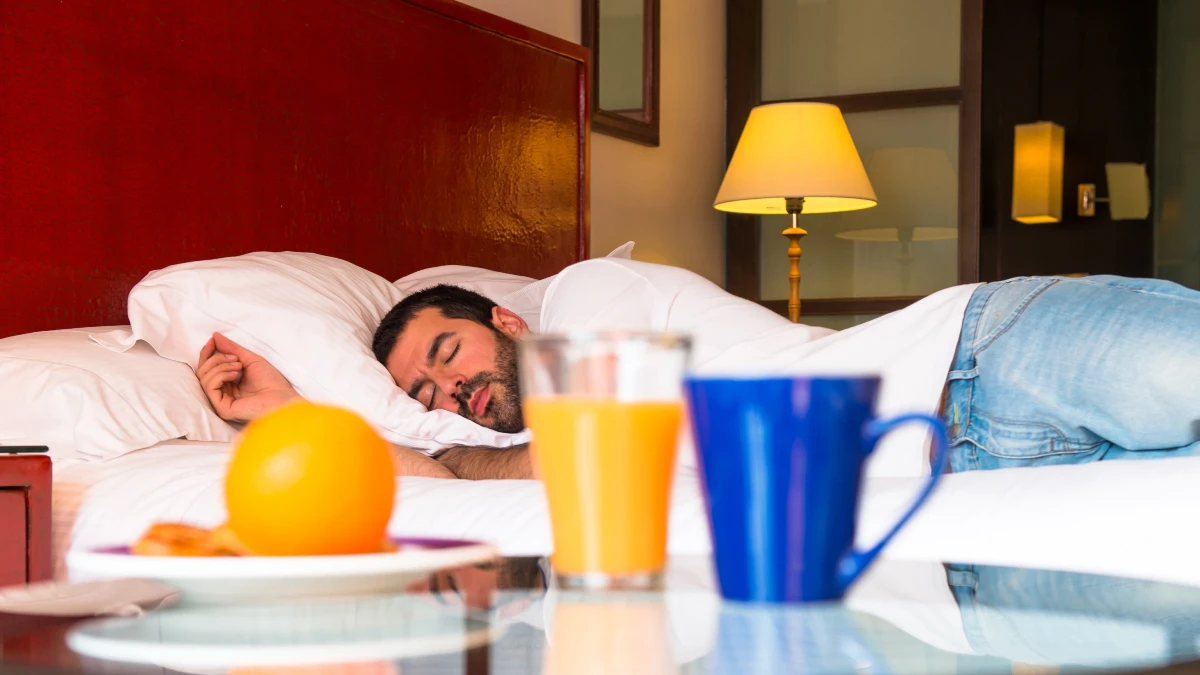
Consistently relying on weekends to “catch up” on sleep is a classic behavioral sign that you are accumulating a significant sleep debt during the week. While sleeping in can feel restorative, it is your body’s desperate attempt to compensate for the deficit you have built from Monday to Friday.
This pattern is a direct consequence of the fact that a majority of adults get less than the recommended amount of sleep on weekdays.
While this strategy can provide temporary relief, it is not a sustainable long-term solution. Furthermore, this drastic shift in your sleep schedule disrupts your body’s internal clock, or circadian rhythm.
This creates a phenomenon known as “social jetlag,” which is why you may feel particularly groggy and disoriented on Monday morning, making it even harder to get back on track for the week ahead.
Conclusion
The sleep deprivation epidemic is real. Its signs are in our foggy thinking, short tempers, and bad habits. For too long, we’ve thought being tired was just the price of being busy. The science is clear: that’s a dangerous idea.
These signs are warnings from a body in trouble. Ignoring them can lead to serious disease, mental health struggles, and a lower quality of life.
But here is the good news: you can fix this. As Dr. Matthew Walker says, sleep is an “incredible investment” in your health. Getting enough good sleep is the single best thing you can do each day to reset your body and mind.
You can start tonight. Don’t feel overwhelmed. Just pick one small thing. For the next week, commit to turning off all screens one hour before bed. Or set a wake-up time and stick to it, even on Saturday. Stop accepting tiredness as normal. Start investing in the power of sleep.
